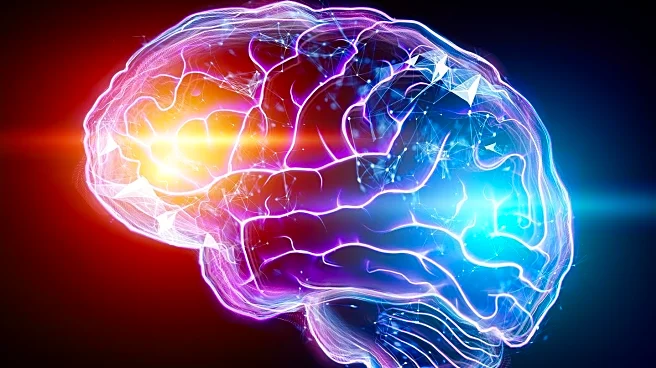What's Happening?
Researchers at Virginia Tech have discovered that memory loss in aging brains is linked to specific molecular changes. Led by Associate Professor Timothy Jarome, the team used gene-editing tools to target
these changes, improving memory performance in older rats. The studies focused on two key processes: K63 polyubiquitination and the activity of the IGF2 gene. In the hippocampus, increased levels of K63 polyubiquitination were reduced using CRISPR-dCas13, enhancing memory. In the amygdala, further reduction of K63 polyubiquitination also improved memory. Additionally, the team reactivated the IGF2 gene, which supports memory formation, by removing DNA methylation tags, resulting in better memory in older rats.
Why It's Important?
This research is significant as it provides insights into the molecular mechanisms behind memory loss, a condition affecting over a third of people over 70 and a major risk factor for Alzheimer's disease. By identifying and targeting these molecular changes, the study opens potential pathways for developing treatments for memory decline and dementia. The findings suggest that memory loss is not caused by a single factor but involves multiple molecular systems, highlighting the complexity of brain aging. This could lead to more comprehensive approaches in treating age-related cognitive decline, benefiting millions of individuals and reducing the societal and economic burden of dementia-related conditions.
What's Next?
The research team plans to further explore the broader molecular systems involved in memory decline. Future studies may focus on understanding how these molecular changes interact and contribute to Alzheimer's disease. The findings could guide the development of new therapeutic strategies targeting these molecular processes. Collaboration with other research institutions may enhance the understanding of memory-related disorders, potentially leading to clinical trials and the development of gene-editing therapies for human application.
Beyond the Headlines
The ethical implications of using gene-editing technologies like CRISPR in humans will need careful consideration. While promising, these technologies raise questions about long-term effects and accessibility. The research also underscores the importance of early intervention in age-related memory decline, suggesting that timing is crucial for effective treatment. This could shift the focus of healthcare policies towards preventive measures and early diagnosis, potentially transforming the approach to aging and cognitive health.











